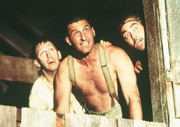THE WOOD CHIPPER has been replaced by a cyclops in the Coen Brothers’ latest, a PG-13 outing that’s more beholden to Jimmie Rodgers than Homer. Adapting The Odyssey to 1937 Mississippi is a joke, of course, in the Coens’ usual nudge-nudge, wink-wink sort of way, so don’t expect too many exact mythic parallels between the homeward journey of convict Ulysses Everett McGill (George Clooney) and ancient Greece. Instead, it’s the bluegrass bandwidth of Depression-era radio that really defines the film, which is, properly speaking, the Coens’ first musical (complete with one memorable field-marching Busby Berkeley-style scene that can’t be fully divulged).
O BROTHER, WHERE ART THOU?
directed by Joel Coen with George Clooney, John Turturro, Tim Blake Nelson, Charles Durning, John Goodman, and Holly Hunter opens December 29 at Egyptian
In our story, three damned souls make their break from a chain gang: dapper, hair-obsessed Everett, ornery Pete (John Turturro), and sweet, dim Delmar (Tim Blake Nelson). Everett’s the self-appointed leader, Pete the complainer, Delmar the innocent follower. Hoping to recover a buried trove of loot, they have their fortune told by an ominous blind oracle, but their picaresque odyssey is treated for laughs, not tragedy. The soothsayer foresees “O so many startlements,” which are exactly what the trio gets along the way.
Accordingly, being a Coen Brothers film, O Brother is comprised of many funny fragments inspired by The Odyssey‘s shattered whole. John Goodman appears as a menacing one-eyed salesman; our heroes are waylaid by sirens; one man is apparently transformed into an animal; there’s even a suitor to defeat. (Holly Hunter’s on hand as an almost unfaithful spouse.) Typically, the Coens also place their characters in a world constructed of other movies. Preston Sturges’ Sullivan’s Travels is directly invoked, while the escapees are pursued by an evil sheriff out of Cool Hand Luke. Crossing paths with the prisoners’ flight, a political campaign like All the King’s Men is also taking place, with marvelous Charles Durning as the blusteringly short-tempered governor.
MUSICAL INTERLUDES, the best thing about O Brother, offer the chance to link together the story’s frayed strands. With music scored and selected by T-Bone Burnett, the film features excellent bluegrass and spiritual standards delivered in an appropriately plaintive, unadorned style. (The actors’ voices are dubbed, with only Nelson singing one number.) “You Are My Sunshine,” “In the Jailhouse Now,” and “Big Rock Candy Mountain” are among the period tunes deployed; contemporary artists including Gillian Welch, Emmylou Harris, and Alison Krauss contribute to the soundtrack. New Orleans bluesman Chris Thomas King plays a Robert Johnson-like character who meets the three convicts at a crossroads, and they go on to form the hit-making Soggy Bottom Boys.
Tapping your foot to the beat almost carries the picture through its narrative fits and starts, which grow more profound and problematic after the first hour. O Brother falls into the category of lesser Coen works (like The Big Lebowski or The Hudsucker Proxy), enjoyable enough for the brothers’ fans but likely to confound Clooney’s. In his performance, however, the star invariably recalls another dapper, mustachioed figure of the ’30s: Clark Gable (especially in It Happened One Night). Clooney displays utterly winning charisma as cocksure Everett, “the one with the capacity for abstract thought,” he brags. (Odysseus was crafty; Everett only fancies himself as such.) Meanwhile, Coen vet Turturro twists his mug for comic effect, and Nelson amusingly embodies a slack-jawed rube (some may recall him as the director of Eye of God, a SIFF-winner in ’97).
Given such on-camera talent, the Coens should’ve put more care into their script. Instead of using Homer’s epic poem to supply some Fargo-like gravity to their comedy, the brothers play with old-fashioned film technique and newfangled digital technology. Diagonal wipes and iris fade-outs punctuate compositions that have been painstakingly color-blanched and coded like old postcards. Unfortunately, such care doesn’t gibe with O Brother‘s slapdash writing and lapses in story coherence. “These things don’t happen for no reason,” Everett protests of illogical events, but in this movie, O Yes, they do.








